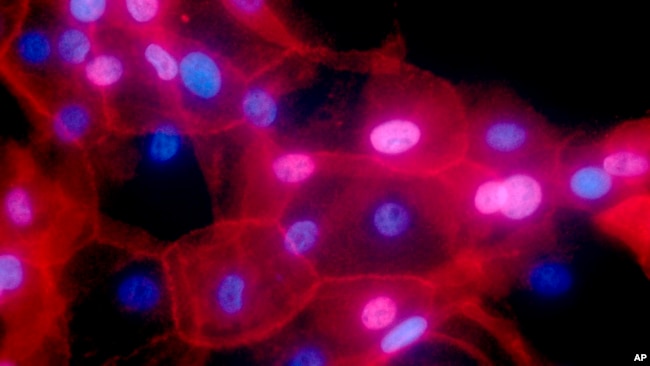驚きの研究結果です!!!
近親者の苦しみを間近で見てきましたから。
しなくて済むのであれば、それに越したことはありません!!
これからの研究成果がさらに期待されます。
VOAで英語を学びましょう!!
研究結果 :一部のがん患者には手術後の治療が必要ない可能性(和訳)
Studies: Some Cancer Patients May Not Need Treatments after Surgery
June 13,2022
手術後、より短く、より優しい癌治療を探求する最近の2つの研究が、一部の癌患者は放射線や化学療法などの治療を安全に避けることができると述べています。
研究者たちは、費用と悪い副作用を削減するために、どのがん患者が不必要な治療を避けることができるかを予測する方法を探しています。
1つの新しい研究では、血液検査を使って、どの結腸癌患者が手術後の化学療法をスキップできるか、あるいは受けないかを研究しています。また、別の研究では、低リスクの乳がん患者の中には、腫瘤やしこりを外科的に除去する手術、いわゆる乳腺摘出術、の後に放射線照射を必要としない場合があることが示唆されています。
これらの研究は、米国臨床腫瘍学会(ASCO)の年次総会で最近議論されました。この結腸癌研究は、オーストラリアと米国の政府および非営利団体の出資により行われ、最近、New England Journal of Medicine誌に発表されました。
フレッド・ハッチンソンがんセンターのステイシー・コーエン博士は、”この研究結果は、医師が化学療法によって真に恩恵を受けると思われる患者に細心の注意を払い、化学療法が不要と思われる患者には副作用を避けることを可能にする”と述べています。コーエン氏は大腸癌の知見について検討し、研究には関与していません。
大腸癌の研究
多くの大腸がん患者は、治癒する可能性があるにもかかわらず、手術後に化学療法を施されます。この薬には、吐き気、貧血、記憶障害などの悪い副作用が伴うことがあります。
しかし、どの患者がこれ以上の治療を必要としないかもしれないかを判断することは、これまで困難でした。そこで、科学者たちは、ある血液検査が医師の判断に役立つかを研究したのです。
この研究では、癌が結腸壁に広がったために手術を受けた455人の患者を対象としました。手術後、あるグループは腫瘍の遺伝子情報を調べるために特別に作られた血液検査を受け、残っている癌のDNAの断片を見つけることができました。
この血液検査によって、患者さんの治療が進められました。血液検査で癌が残っていないことが分かれば、化学療法は行いませんでした。一方、残りの患者に対しては、医師は通常の方法で、腫瘍とその近傍の組織を注意深く調べながら化学療法を決定しました。
化学療法を受けた患者は血液検査グループの方が少なく、- 28%に対し、15%でした。しかし、両グループの約93パーセントは2年後も癌がない状態でした。言い換えれば、血液検査グループはより少ない化学療法で同じようにうまくいったということです。
この研究は、オーストラリア・メルボルンのピーター・マッカラム癌センターのジャンヌ・タイ博士が主導しました。タイ氏は、この研究結果を、がんの再発-改善した後に再びがんが発生すること-の観点から説明しました。
「手術後に癌のDNAが検出されない患者では、癌の再発の可能性は非常に低く、化学療法がこれらの患者に有効である可能性は非常に低いことを示唆しています。」とタイ氏は述べます。
ASCO会長のエヴェレット・ヴォークス博士は、”もし病気の再発リスクがないなら、化学療法を行わないことは、その人のQOLに大きな違いが出る”と述べています。
もう一つの研究は、一般的な早期乳癌で、Ki67と呼ばれるタンパク質のレベルが低い高齢女性500人を追跡調査したもので、これは急速に成長する癌の目印となります。
手術後、この種の癌の一般的な治療法であるホルモン遮断薬を服用しましたが、放射線治療は受けませんでした。
5年後、10人の女性に同じ乳房にがんが再発し、乳がんによる死亡が1人ありました。この研究には比較対象がありませんでしたが、研究者は、この結果は放射線治療を受けた同様の患者の過去のデータとよく比較されると述べています。
オンタリオ州ハミルトンのマクマスター大学のティモシー・ウィーラン博士は、この研究を主導しました。
「我々は、この集団において、放射線の利点は、副作用と比較して非常に小さいと推定しています。」とウィーラン氏は言います。
放射線は、皮膚の問題、疲労感、そして、あまり一般的ではありませんが、長期的な心臓の問題や二次癌を引き起こす可能性があります。
NYU Langone Healthのデボラ・アクセルロッド博士は、この研究には関与していません。
アクセルロッド氏はこの研究を、低リスクの腫瘍を持つ患者に対する”気分の良い”メッセージであると述べます。アクセルロッド氏は、このデータは、医師がどの患者に対して”安心して、自信を持って”放射線を照射しないことができるかを理解するのに役立つと付け加えています。
Studies: Some Cancer Patients May Not Need Treatments after Surgery
After surgery, some cancer patients can safely avoid treatments such as radiation or chemotherapy, say two recent studies that explore shorter, gentler cancer care.
Researchers are looking for ways to predict which cancer patients can avoid unneeded treatment to cut down on costs and bad side effects.
One new study used a blood test to study which colon cancer patients could skip, or not have, chemotherapy after surgery. Another study suggests some low-risk breast cancer patients might not need radiation after the surgical removal of a mass or lump, a surgery known as a lumpectomy.
The research was discussed recently at the yearly meeting of the American Society of Clinical Oncology (ASCO). The colon cancer study, financed by the Australian and U.S. governments and nonprofit groups, was recently published by the New England Journal of Medicine.
The findings let doctors pay careful attention to “the patients we think would truly benefit from chemotherapy and avoid the side effects for patients for whom it’s likely unnecessary,” said Dr. Stacey Cohen of the Fred Hutchinson Cancer Center. Cohen reviewed the colon cancer findings and was not involved in the research.
Colon cancer study
Many colon cancer patients are given chemotherapy after surgery, even though they may be cured. The drugs can come with bad side effects such as nausea, anemia and memory problems.
But deciding which patients might not need further treatment has been difficult. So, the scientists studied whether a blood test could help doctors make the decision.
The study involved 455 patients who had surgery because cancer had spread into the colon wall. After surgery, one group received a blood test specially made for the tumor’s genetic information to find any remaining bits of cancer DNA.
Their care was guided by the blood test. If the test showed no signs of remaining cancer, the patients did not get chemotherapy. Meanwhile, doctors made chemotherapy decisions for the rest of the patients in the usual way, guided by careful study of the tumor and nearby tissue.
Fewer patients in the blood test group got chemotherapy — 15 percent in comparison to 28 percent. But about 93 percent of both groups were still free of cancer after two years. In other words, the blood test group did equally well with less chemotherapy.
Dr. Jeanne Tie of the Peter MacCallum Cancer Center in Melbourne, Australia, led the research. Tie described the findings in terms of cancer relapse - the return of a cancer after a period of improvement.
“In patients where cancer DNA is not detected after surgery, the chance of cancer relapse is very low, suggesting that chemotherapy is very unlikely to benefit these patients,” Tie said.
ASCO president Dr. Everett Vokes said that not having chemo makes “a big difference in a person’s quality of life if that can be done without having to put them” at risk of the disease coming back.
Breast cancer
The other study followed 500 older women with a common form of early-stage breast cancer and low levels of a protein known as Ki67, a marker for fast-growing cancer.
After surgery, the women took hormone-blocking pills, a common treatment for this type of cancer. But the women did not get radiation treatment.
After five years, 10 of the women saw cancer return in the same breast, and there was one breast cancer death. The study had no comparison group, but researchers said the results compare well to historical data for similar patients who had radiation.
Dr. Timothy Whelan of McMaster University in Hamilton, Ontario, led the study.
“We estimate the benefits of radiation would be very small in this population compared to the side effects,” Whelan said.
Radiation can cause skin problems, tiredness and, less commonly, long-term heart problems and second cancers.
Dr. Deborah Axelrod of NYU Langone Health was not involved in the research.
Axelrod described the study as a “feel-good” message for patients with low-risk tumors. Axelrod added that the data will help doctors understand which of their patients they “can comfortably, with confidence” not give radiation to.
Words in This Story
chemotherapy – n. medical: the use of chemicals to treat or control a disease (such as cancer)
benefit—v. to be useful or helpful to (someone or something)
nausea – n. the feeling you have in your stomach when you think you are going to vomit
anemia – n. medical: a condition in which a person has fewer red blood cells than normal and feels very weak and tired
tumor – n. a mass of tissue found in or on the body that is made up of abnormal cells
hormone – n. a natural substance that is produced in the body and that influences the way the body grows or develops
detect -- v. to discover or notice the presence of (something that is hidden or hard to see, hear, taste, etc.)
